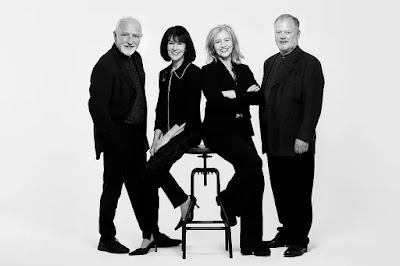 |
| The Brodsky Quartet |
Beethoven String Quartet No. 16 in F, Op. 135, Grosse Fuge, Op. 133; Brodsky Quartet; Kings Place
Reviewed by Robert Hugill on 31 October 2020 Star rating: (★★★★)
A sampling of the Brodsky Quartet's valuable rush-hour series devoted to Beethoven's last string quartet
The Brodsky Quartet's recordings of Beethoven's late quartets were issued on Chandos [Amazon] in January this year, but a planned series of associated rush-hour concerts had to be suspended. On 31 October 2020, the Brodsky Quartet (Gina McCormack, Ian Belton, Paul Cassidy, Jacqueline Thomas) returned to Kings Place for performances of Beethoven's String Quartet No. 16 in F, Op. 135 and Grosse Fuge, Op. 133, plus Mendelssohn's Fugue for String Quartet, Op.81 No. 4, and I caught their 4pm program (the second of three).
Beethoven's Op. 135 quartet was almost his last major work, written in 1826 and premiered the year after Beethoven's death. After the complex weight of the other late quartets, this one is surprisingly classical and in a short spoken introduction, viola player Paul Cassidy talked about how much humour the Brodsky Quartet found in these late quartets.
We started with Op. 135 and the first movement Allegretto was gracefully classical with stylish interactions between the players, yet even here all was not calm and there was an intriguing sense of questioning about the movement. The Vivace second movement started out joyous and full of rhythmic fun, but then this turned into highly demonstrative rhythmic vigour. The sustained violin melody of the slow movement gave the piece a rather touching feel, yet the sheer concentrated nature of the playing made the music rather intense. The fourth movement opened with the series of musical gestures over which Beethoven wrote, in the manuscript, 'Muss es sein?' and 'Es muss sein!', interlacing chords which returned during the movement to add a layer of intense questioning to the joyous delight of much of the movement.
Next came Mendelssohn's Fugue for String Quartet, from his posthumus Opus 81 which was assembled from four separate pieces after his death. It was classical and rather elegant, and the players made it lead straight into Beethoven's Grosse Fuge. Originally written as the final of the Opus 130 string quartet, Beethoven's publisher persuaded him to finish the quartet with something lighter. Grosse Fuge is indeed large scale and powerful, yet the Brodsky Quartet's performance combined trenchant questions with tender moments. Much of it was inexorable, the there were lovely transparent sections and some surprisingly perky playing, whilst the questioning nature of the piece towards the end almost inclined to the mystical.
The quartets final concert in the series takes place tomorrow, with Beethoven's Opus 130 quartet [Kings Place]
- The smallest ditty can feel like a marathon if it does not fit the voice: following his appearance with Blackheath Halls Opera, I chat to tenor Nicky Spence about his career and planning roles - interview
- A timely reminder of what we are missing: The Crimson Bird, orchestral works by Nicola Lefanu on new disc from NMC - CD review
- Three Tributes: music by Kevin Puts, Andrea Clearfield and Gunther Schuller - CD review
- More than a curiosity: Malcolm Arnold's forgotten opera The Dancing Master - CD review
- An honourable failure or a misunderstood masterpiece? Another look at Weber's Oberon - feature article
- Weber at home: Complete keyboard duets from Julian Perkins and Emma Abbate - Cd review
- Everything via Association: composer Vic Hoyland on his 75th birthday - interview
- Welcome to the high energy world of Irish composer Ed Bennett: Psychedelia from NMC - CD review
- From the whole earth dancing to a day in hell: chamber music by Cheryl Frances-Hoad - CD review
- The case against Wagner - David Faiman's Meyerbeer: The deliberately forgotten composer - book review
- Mendelssohn Cello Sonatas and more: historically informed performances from cellist Viola de Hoog and pianist Mikayel Balyan - CD review
- Home











No comments:
Post a Comment